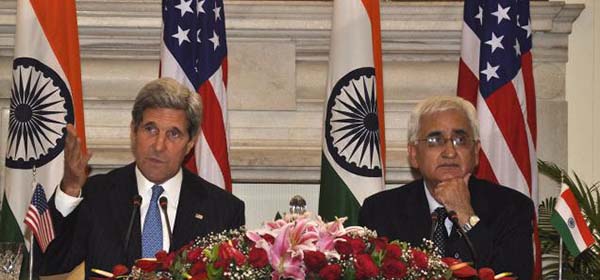NEW DELHI - India and the United States held the fourth edition of the India-US strategic dialogue here on Monday, which focused on regional security issues, India's relations with Iran, and developments in Afghanistan.
Following the meeting, US Secretary of State John Kerry, in a joint media briefing along with Indian External Affairs Minister Salman Khurshid, defended his country's surveillance program and criticized Russia for hosting former intelligence operative Edward Snowden, who faces charges of espionage in US over his leaking of a massive information on Washington's surveillance project.
"There is a tremendous amount of misinformation about PRISM," Kerry said, pointing out that it does not look into individual emails, listen to phone calls, or look at contents.
"This program is a random survey of anybody's phone," Kerry said on snooping, adding "after the Boston bombings, the first question we were asked is: why didn't you notice they were getting radicalized." Kerry is in India for a three-day visit. His arrival has been eclipsed by the news of Snowden's flight to Moscow from Hong Kong. He sought to warn Russia of consequences for violating "the reciprocity of international law".
"We have transferred seven prisoners to Russia. There are very severe consequences to violating the reciprocity of international law," he said, adding "I would urge Russia to live up to international standards of the law. Snowden is an indicted felon and all appropriate countries have been notified of his status." For his part, Khurshid said India and US are expanding bilateral ties to new horizons and discussions on global issues and other strategic issues. "We have just completed detailed discussions covering key strategic pillars of our relationship including security, economics, technology, regional strategic and political issues, and global issues. Our discussions were truly characterized by convergence and candor," Khurshid said.
On Afghanistan, both countries agreed to "remain committed" to united, sovereign, peaceful Afghanistan.
The US Secretary of State said, "US is grateful for India's support to Afghanistan. The people of Afghanistan need to see and feel that the elections are free and fair. India should do whatever possible to aid it." Kerry noted that his country will equip and train Afghan forces well beyond 2014, expressing his hope that this could provide an avenue for the "reduction of violence." He said, "It is better to explore the possibility of having a peaceful resolution if it is possible. If conditions are met, then negotiations will take place with the high peace council of Afghanistan." However, Khurshid said that it's very clear what the objective is, adding that "talks with Taliban was an issue we discussed. We need to be on the same page. We need to share with each other." On Iran, India said the country would want to see a peaceful settlement to the issue "that is a burning issue". Khurshid said, "We have valuable relationship with Iran. My reading from visit to Iran has been conveyed to Secretary Kerry." Furthermore, the US official said, "We urge Iran to prove to the world that their peaceful nuclear program is indeed peaceful. We hope India will help us.
" H added, "We hope India can urge Iran leadership to take advantage of this moment and to urge Iran not to miscalculate the US. We appreciate steps taken by India to reduce dependence on Iran oil. US completely understand relationship between India and Iran." Both countries agreed to "take this relationship to new heights" and talked about defense, education, agriculture, health, commercial enterprises and investments besides other areas of interest.
Moreover, they reaffirmed commitment to full and timely implementation of the civil nuclear deal and announced visit of US Vice President Joe Biden to India late July. (KUNA)

